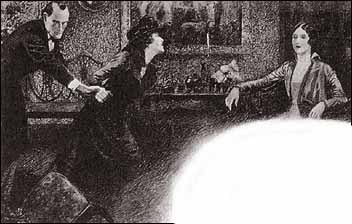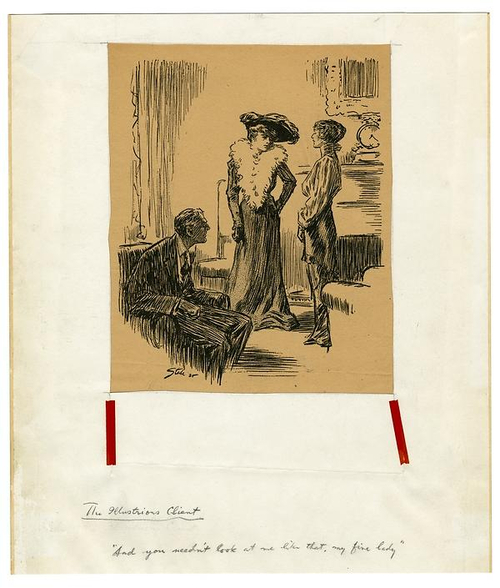Femme Friday: Kitty Winter
Sherlock Holmes is as reliable on the subject of his own opinions regarding females as John Watson is about trifling matters like chronology. No, seriously—they’re both equally skilled humans when it comes to communicating their own facts. Take, just to preface this piece, Holmes on the subject of women:
“Women are never to be entirely trusted—not the best of them.” –The Sign of Four
“Puurrr scritch knead hsssss prrrrrrrr, you are so awesome I can’t stand it, let’s be pals forever.” –Actual (Paraphrased) Sherlock Holmes Behavior with Several Women from the Canon
Sherlock Holmes treats women just as he treats men, for the most part—well when he thinks them honorable, poorly when he thinks them duplicitous. Meanwhile, nowhere does Sherlock Holmes prove himself more of a gallant pussycat than when it comes to Kitty Winter, as he clearly takes every measure he can to shield her from the long arm of the law.

But this isn’t about Sherlock Holmes, and I have a confession to make. My Baker Street Irregulars investiture (unexpected when it came, cherished today) is Kitty Winter. I am not the first to carry this ferocious nomenclature. ASH, BSI Maureen Green was the original, and she tragically passed before I had the opportunity of meeting her. I regret this as I wander about with her pseudonym, hoping she approves posthumously. Additionally, Kitty as a character (and as an emblem of the population of females she embodies) is very important to me in other ways, so let’s talk about those.
Let’s talk about slut-shaming for a second, shall we? Don’t do it. Sherlock Holmes didn’t, so why should we?
If you’re clutching your pearls right now, read no further, because Sherlock “Misogynist” Holmes behaved in a much more civilized manner. “The Illustrious Client” emphatically resides in my top five canonical cases for several reasons. One is that we very seldom see Holmes miscalculate, so it is something of a bitter pleasure to watch his ass being handed to him after sassing five too many thugs (or simply the wrong thug, the “unlucky” thug, the one named Baron Adelbert Gruner). When heroes are too complacent or too competent, we lose interest, so Holmes’s fallibility in this instance is extremely valuable in the storytelling sense. Far more interesting to me, however, is the way in which he treats Kitty Winter.
During the Victorian era, it was thought decorous to cover the legs of tables lest improper thoughts arise, whilst concurrently, wicked dirty sloppy epic porn was being written (and published), probably because people thought hovercraft tables were weird and were hoping for a mahogany stem from time to time so they could picture a clawfoot ottoman when wanking in the shower. I figure people can already parse my thoughts on hypocrisy at this point, so I’ll stick to hard data. Women fell into five categories, so far as I can tell: virtuous youth, virtuous matron/widow, not-white-so-you-don’t-count, wife, and whore.
Sherlock Holmes in “The Illustrious Client” is consulted upon an unlikely topic, as I’m fairly sure he abhors domestic squabbles and wishes he could confine himself entirely to locked rooms: Baron Gruner is about to marry Violet de Merville, a beautiful (and rich) and poised (and rich) woman whose male chaperones think it might be a bad idea for her to marry a dude who almost certainly shanked his exes. This might have devolved pretty quickly into a revolting moral fable, but when Sherlock Holmes agrees that Violet ought not expose herself to quite so many shivs, he brings in a survivor of the identical abuse: one Kitty Winter.
It’s worth pointing out that most “Kitty Winter” pictures tagged on tumblr look like this:
Violet is set up by the men in the consulting room as being nine hundred percent cray-cray: “To say that she loves him hardly expresses it. She dotes upon him; she is obsessed by him. Outside of him there is nothing on earth. She will not hear one word against him,” reports Colonel Damery, who gives us a clue as to the state of the sitting room by refusing to remove his gloves for the entire interview.
Holmes initially declines to approach the potential victim in person. Instead, he visits Gruner, warns him off, is warned off in turn, and reports back to Watson. I will paraphrase his summary of these events with the words, “I Visited Baron Gruner’s Chinese Pottery Barn and Snuff Sex Shoppe, And All I Got Was This Shitty T-Shirt.”
Enter Kitty Winter. In Watson’s words, Shinwell Johnson was seated and:
…beside him on the settee was a brand which he had brought up in the shape of a slim, flame-like young woman with a pale, intense face, youthful, and yet so worn with sin and sorrow that one read the terrible years which had left their leprous mark upon her.
So Kitty Winter is a hooker.
Let’s make no bones about this. We are as close as we ever, ever, ever come here to Doyle mentioning “unfortunates” existed. Why is Kitty Winter a fallen woman? She hasn’t done anything wrong, not that we know of. She seems a kind, intelligent, wryly funny person. When indirectly asked how she was found, Kitty quips, “Hell, London, gets me every time.” Her suburb is clearly uncomfortable, her occupation the eldest one, her mind sharp and her sass factor off the charts. Sherlock Holmes is meant to be squirrelly around the ladyfolk, meanwhile, and might presumably have shied away from this jezebel:
Holmes smiled. “I gather we have your good wishes, Miss Winter.”
Nah. Holmes is fine.
“…well, there, she’ll speak for herself,” Shinwell “Porky” Johnson avers.
Hell yeah she will. In the Granada adaptation, she does so without words:
If I were left to my own devices entirely, I’d quote everything Kitty Winter said throughout the entire case, but that would prove inefficient. First off, she sits there in this room full of men—a nark, a consulting detective, and an army doctor—and tells them without any trace of shame that Baron Gruner ruined her. She mentions, “Porky Shinwell has been telling me. He’s after some other poor fool and wants to marry her this time.” Baron Gruner never offered to marry Kitty. She’s confessing to three Victorian men that she had sex with the Baron and he hadn’t even proposed. She loved him, so she slept with him—that’s what Kitty has admitted in the Baker Street sitting room. Does Holmes throw her to the kerb (curb)? No.
Holmes asks her, very courteously, what more she can tell them. And she answers:
I tell you, Mr. Holmes, this man collects women, and takes a pride in his collection, as some men collect moths or butterflies. He had it all in that book. Snapshot photographs, names, details, everything about them. It was a beastly book–a book no man, even if he had come from the gutter, could have put together. But it was Adelbert Gruner’s book all the same. ‘Souls I have ruined.’ He could have put that on the outside if he had been so minded.
 You can call Gruner whatever you like. Call him a serial murderer, a philanderer, a liar, a killer, a fiend, a brute eager to trample anyone in his path. Whatever you call him, Kitty Winter had the guts to say she’d face down his fiancée as a last resort, and when Holmes offers to pay her for this service:
You can call Gruner whatever you like. Call him a serial murderer, a philanderer, a liar, a killer, a fiend, a brute eager to trample anyone in his path. Whatever you call him, Kitty Winter had the guts to say she’d face down his fiancée as a last resort, and when Holmes offers to pay her for this service:
“None of that, Mr. Holmes,” cried the young woman. “I am not out for money. Let me see this man in the mud, and I’ve got all I’ve worked for–in the mud with my foot on his cursed face. That’s my price. I’m with you to-morrow or any other day so long as you are on his track.”
What a woman, as some have said. What a woman! Sir Arthur Conan Doyle was passionate on the subject of divorce reform, as well he should have been. Holmes in an uncannily Doyle-like voice protests to Violet de Merville:
But I really did plead with her with all the warmth of words that I could find in my nature. I pictured to her the awful position of the woman who only wakes to a man’s character after she is his wife–a woman who has to submit to be caressed by bloody hands and lecherous lips. I spared her nothing –the shame, the fear, the agony, the hopelessness of it all.
Of course this doesn’t work, but Kitty does Holmes one better. This is one of the most striking feminist passages in the entire canon, because Kitty gives zero fucks about Violet, but she’s there to say her piece anyhow, and meanwhile Holmes has brought a whore to show-and-tell to serve as his evidence, so we are already waaaaaaaaaaaay outside the land of shrouded table legs here:
I am his last mistress. I am one of a hundred that he has tempted and used and ruined and thrown into the refuse heap, as he will you also. Your  refuse heap is more likely to be a grave, and maybe that’s the best. I tell you, you foolish woman, if you marry this man he’ll be the death of you. It may be a broken heart or it may be a broken neck, but he’ll have you one way or the other. It’s not out of love for you I’m speaking. I don’t care a tinker’s curse whether you live or die. It’s out of hate for him and to spite him and to get back on him for what he did to me. But it’s all the same, and you needn’t look at me like that, my fine lady, for you may be lower than I am before you are through with it.
refuse heap is more likely to be a grave, and maybe that’s the best. I tell you, you foolish woman, if you marry this man he’ll be the death of you. It may be a broken heart or it may be a broken neck, but he’ll have you one way or the other. It’s not out of love for you I’m speaking. I don’t care a tinker’s curse whether you live or die. It’s out of hate for him and to spite him and to get back on him for what he did to me. But it’s all the same, and you needn’t look at me like that, my fine lady, for you may be lower than I am before you are through with it.
Later in the case, highly dramatic events occur. Holmes is beaten to a pulp, Watson is devastated, Gruner gloats, and Kitty ends up throwing vitriol in her persecutor’s smug face. Most tellingly, I think, Holmes is severely injured in act three, and he then enlists allies. Of course he assigns Watson the essential role of affable decoy—Watson was practically gnashing his teeth over Holmes’s sickbed, which is lovely in its own right. But then Sherlock Holmes brings Kitty along with him to burgle the house.
Clearly, Holmes thinks she might know where the lust diary is. But it doesn’t matter to him that she lives in Hell, London. It doesn’t matter that she’s a prostitute. It doesn’t matter that she rode Baron Bruner like a rodeo cowboy when only men were meant to have sex drives. Sherlock Holmes gives nil shits on all of these topics. And I appreciate that, because I adore Kitty Winter. And I would argue that—despite his nasty comments on the subject of hairpins and curling-tongs—Sherlock Holmes did too.

Lyndsay Faye is the author of several novels, has been translated into 13 languages, but remains in love with English. You can find out more about them at lyndsayfaye.com & poke her on twitter @LyndsayFaye.
BSB Lyndsay, ASH “The Fascinating Daughter of a California Millionaire,” BSI “Kitty Winter.”





